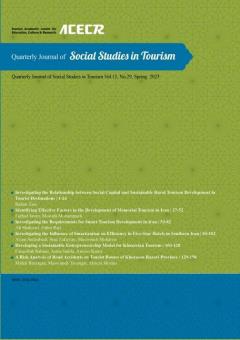Investigating the Influence of Smartization on Efficiency in Five-Star Hotels in Southern Iran
Subject Areas :
AZAM SAFARABADI
1
![]() ,
SINA ZAFARIAN
2
,
masoomeh moharrer
3
,
SINA ZAFARIAN
2
,
masoomeh moharrer
3
1 - Assistant Professor of Tourism and Hospitality Management Department, Shiraz University, Shiraz, Iran
2 - MA. student in tourism management, majoring in marketing, Shiraz University, Shiraz, Iran
3 - Department of Tourism and Hospitality Management, Shiraz University, Shiraz, Iran
Keywords: Hotel operational processes, Smart hotel, Automation, Thematic analysis, SECA,
Abstract :
As a transformative paradigm within the hospitality industry, smartization leverages technologies such as artificial intelligence, the Internet of Things, robotics, and automated systems to transform both operational processes and the guest experience, leading to enhanced efficiency, cost reduction, improved security, and the provision of personalized services. Therefore, this study sought to investigate the influence of smartization on the work processes of hotels, employing a mixed-methods (qualitative-quantitative) research design with an exploratory approach. In the qualitative phase, thematic analysis and library research were utilized to identify smartization indicators across three domains: operational (Reception, Accommodation, Food and Beverage, Housekeeping, etc.), support (Human Resource Management, Finance, Infrastructure Maintenance, Sales, and Procurement), and managerial (Planning, Organizing, Leading, and controlling). The quantitative phase employed the SECA (Simple Efficient Criteria Assessment) multi-criteria decision-making method and a multi-objective nonlinear programming model to evaluate the identified criteria. The target population comprised managers of five-star hotels in Southern Iran, from which 25 participants were selected using purposive and snowball sampling methods. The findings of the study revealed that smartization enhanced the guest experience through service personalization, improved efficiency, and cost reduction, consequently leading to increased satisfaction, loyalty, and profitability. Moreover, operational processes have been optimized through the implementation of smart hospitality systems. Additionally, support processes have been improved, contributing to cost efficiencies and enhanced guest satisfaction. On the other hand, managerial processes have been effectively directed and coordinated through the adoption of smart technologies. The quantitative analysis indicated that smartization exerted the most and least significant influence on managerial and operational processes within hotels, respectively. Therefore, it can be argued that the integration of innovative technologies enables hotels to augment productivity and profitability.
